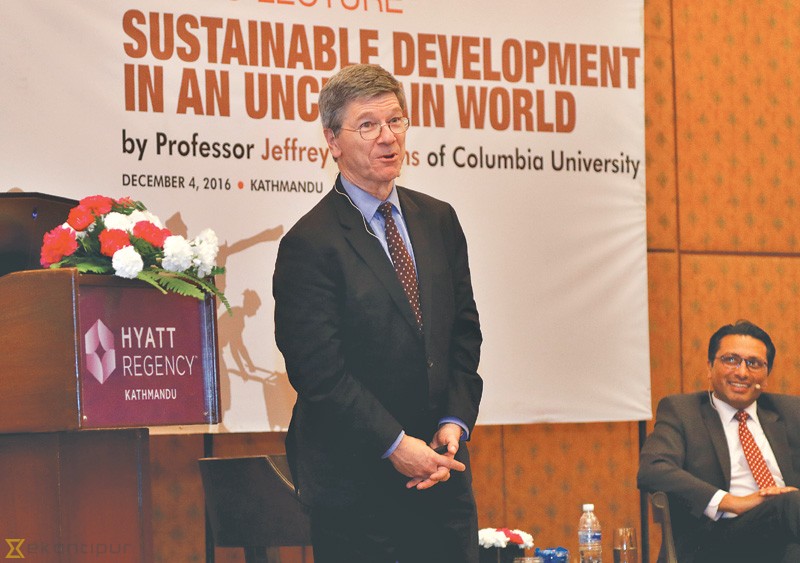Kathmandu, December 5, 2016:Â During a seminar organised by a group of Bolivians at Harvard University in May 1983, Jeffrey D Sachs, now a world-renowned professor of economics, made a comment on hyperinflation faced by the South American country.
Soon a voice at the back of the room said: “Well if you’re so smart why don’t you come [to our country] and help us?â€
Prof Sachs laughed. The voice was heard again, “I mean it.â€
Later, Prof Sachs came to know that the Bolivians present at the seminar, mostly politicians, were looking for an economic advisor. And they proposed that he visit their country.
Prof Sachs did not respond immediately. But after sleeping over the proposal, he said he’d be willing to give it a shot, although he made it clear he has never done anything like this—help a country— before, Prof Sachs has written in his book ‘The End of Poverty’.
Born in Detroit in 1954, Sachs had just become a full professor at Harvard at that time. Having reached that height at the age of 28 was a feat in itself—a result of lecturing widely and publishing broadly. But his work was “theoretical and statistical†in those days rather than practical.
Yet Prof Sachs took up the challenge. After landing in the landlocked, poor and multi-ethnic country, he found that inflation had hit a startling 24,000 percent. Ending this hyperinflation was his main task. But he also had to re-establish a financial base for economic development.
After taking stock of the situation, he prescribed solutions. Soon, inflation started moderating rapidly and currency also stabilised. Other policy prescriptions that he offered also worked.
His job was done. And his first foray into country as an adviser was a success.
This experience made him happy, but it also served him as a wakeup call for “economic realism†and gave him first insights into the problem of economic development. It made him what he is today, as he realised how a country’s resource base, climate, topography, political relations with neighbours, internal ethnic and political divisions, and proximity to world markets can lead to poverty.
Since then he has helped Poland frame a comprehensive plan for the transition from central planning to a market democracy, authored many scholarly and policy papers on economic reforms of China and India, and helped Africa fight poverty and gain access to cheaper medicines for HIV/AIDS.
Over the last three decades, he has advised dozens of heads of state and governments on economic strategy, in the Americas, Europe, Asia, Africa, and the Middle East. These trips—to over 125 countries—exposed him to extreme poverty and made him wonder why it persists in a world where wealth is increasing. This convinced him that the world cannot become a better place unless there is greater cooperation among all the nations.
This belief led him to become one of the intellectual fathers of Millennium Development Goals (MDGs), a United Nations-led initiative that aimed at halving extreme poverty rates to halting the spread of HIV/AIDS and providing universal primary education within 2015.
After the success of the MDGs, Prof Sachs has started focusing more on sustainable development and has helped the UN frame Sustainable Development Goals (SDGs)—a set of 17 goals, which, among others, aims to eradicate world poverty and hunger by 2030.
Nepal, along with 192 other UN members, has adopted the SDGs.
Sustainable development, according to Prof Sachs, is a coherent idea that holds firmly that economic growth can and should be fair, inclusive, and environmentally sustainable.
This means the practice of tracking the growth of gross domestic product (GDP) has to be superseded by a more complex set of objectives that include the fairness of the distribution of GDP, social inclusion and environmental sustainability, Prof Sachs, who arrived in Nepal on Saturday, told a public lecture on ‘Sustainable Development in an Uncertain World’ organised by the National Planning Commission on Sunday.
For Nepal’s sustainable economic development, the country, according to Prof Sachs, must focus on SDG Number 4. This goal, among others, calls for early childhood education for every child.
“We’ve recognised that tradition of enrolling 6- or 7-year-old in kindergarten or Grade 1 is not sufficient because the brain develops critically at age 3, 4 and 5. So, there’s a worldwide move for early childhood education,†Prof Sachs told the lecture attended by around 250 people, including government officials, academia, businesspersons, and foreign diplomats, adding, “This SDG is very important for this country, as it also makes it mandatory for every child to complete secondary education, which is crucial to get a job that keeps people out of poverty.â€
Prof Sachs has always said quality education, healthcare services and social security form a bedrock for sustainable development. But alongside development of the social sector, Nepal should also focus on development of physical infrastructure, especially hydroelectric power projects, he said. “Hydroelectric is a strategic asset for Nepal and it can meet the energy needs not only of Nepal, but India and Bangladesh as well.â€
Nepal, according to Prof Sachs, must make key investments in areas like hydropower not only for its “economic future†but also “for the safety of this countryâ€.
“Nepal is not just sitting by itself but sitting in between two giants…. So, get your political act together…and get the politicians to understand that endless squabbling is not safe for this country,†he told the lecture moderated by NPC member Swarnim Wagle. “Nepal must grow rapidly alongside neighbours for the sake of national security as well.â€
To help Nepal harness hydroelectric potential, Prof Sachs has pledged to help the country tap the private capital markets “so that the low long-term interest rates can be used to finance infrastructure†in Nepal.
“But it would be Nepal’s responsibility to propose [shovel-ready] projects rather than those that are only on papers, because without real projects, it’s all talk,†said Prof Sachs, who left Nepal late Sunday evening.
By Rupak D Sharma







